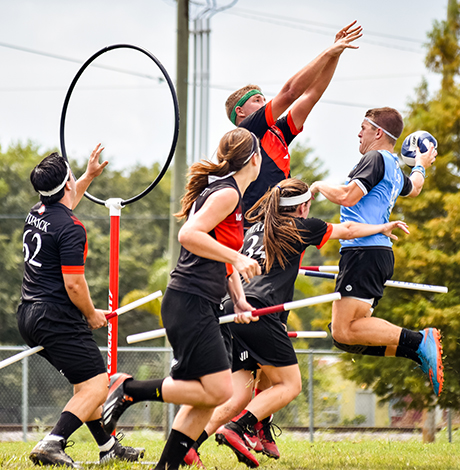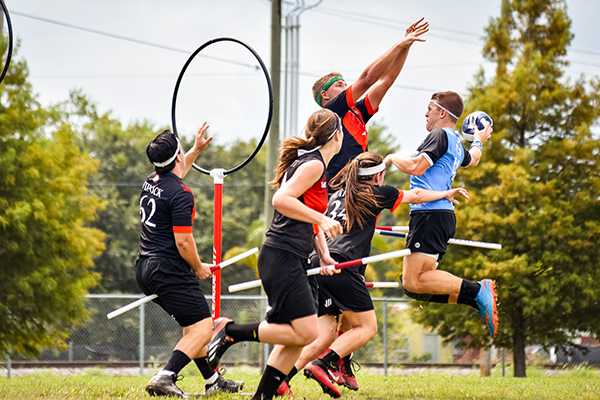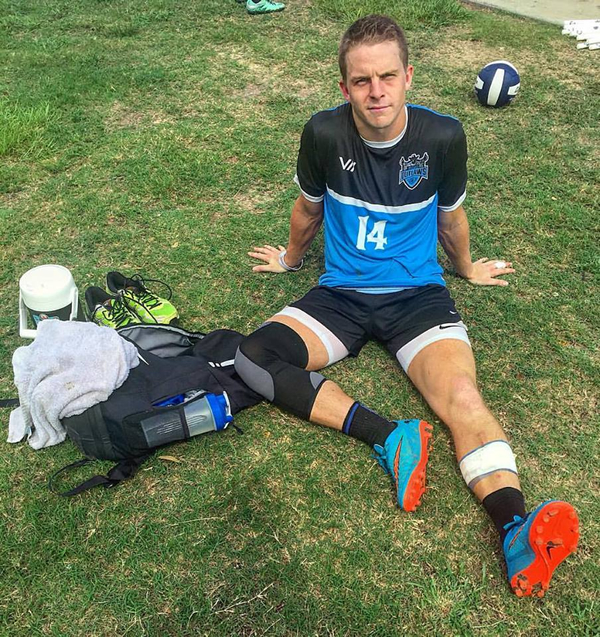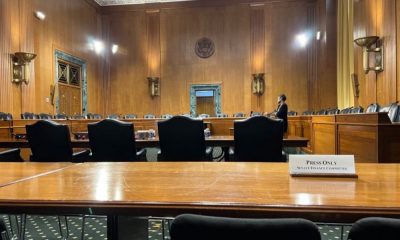Arts & Entertainment
A snitch in time …
‘Harry Potter’-inspired game enthralls gay athlete


Kedzie Teller (far right) playing quidditch with the Austin Outlaws during the 2016 Major League Quidditch tournament. (Photo by Tayyeb Mubarik)
Often life-changing moments come out of the blue.
In spring, 2009, Kedzie Teller stumbled upon a quidditch match between Boston University and Emerson College. His first thought was, “This can’t be real.”
What he didn’t know at that moment was that quidditch, a game inspired by one played in the “Harry Potter” books (albeit sans magical elements), would define the next eight years of his life.
Quidditch is one of the fastest-growing sports in the country with about 200 college and community teams registered with US Quidditch. In 2015, the sport went pro with 16 teams making up four divisions. Locally, Major League Quidditch has representation by the Washington Admirals.
The rest of the world is also catching onto the sport which has been described as a mix of rugby, handball and dodgeball. The International Quidditch Association World Cup is held every two years and in 2016 it drew teams from 21 countries.
Teller grew up in a soccer family all over New England with three sisters who also played the sport. Teller played on travel teams and captained his high school soccer team where he was all-state. He was also a sprinter on the track team and when it came time to pick a college, he had to make a choice.
“I had soccer offers from Division II colleges, but I am very competitive and I wanted to be an athlete at a Division I college,” Teller says. “I ended up accepting a track offer from Boston University in part because they had a communications program for journalism.”
When Teller first noticed the quidditch team on campus, it was the end of his freshman year and he was leaving the track team due to personal differences with the coaching. Hungry for a competitive outlet, he went to a quidditch practice at the beginning of his sophomore year and was immediately hooked.
“It is very competitive and super fun. I fell in love at the first practice,” Teller says. “The team was a mix of athletes and people who love Harry Potter and I met a lot of people who I wouldn’t have met otherwise. We also won a lot and I like to win.”
Teller played for Boston University Quidditch as a chaser for three years and captained in his senior year. When he graduated in 2012, he thought his career was over. Instead, he was selected to the United States National Quidditch Team and played in the inaugural World Cup in London winning a gold medal.
Reinvigorated, he returned to Boston and formed his own team, Q.C. Boston. By that time, US Quidditch had begun allowing community teams to compete against college teams. He was selected again to the national team in 2014 and won another gold medal at the World Cup in Vancouver.
“It has been so special being a part of this sport early on and to watch it develop,” Teller says. “The rules have evolved and the sport is incredibly better now.”
So much better in fact, that there are rumblings of the possibility that quidditch will be an Olympic sport someday. The International Olympic Committee has a list of guidelines when considering a new sport that includes outreach to youth. Yes, kidditch is alive and well.
Teller moved to Texas in 2015 to work as a brand strategist and began playing US Quidditch with the Lone Star Quidditch Club. He was sidelined by a torn ACL but his competitive spirit was still burning bright.
“People said I was done, but I got into the best shape of my life and came back better than ever,” he says. “The experience taught me how much I loved quidditch and how much I wanted to stay in sports.”
Teller was selected as an alternate to the United States National Quidditch Team in 2016 and turned pro when he qualified for the Austin Outlaw’s Major League Quidditch team.
He was selected again in 2017 for the Outlaws team only to have his season cut short when he moved to Philadelphia to further his professional career with the Social Channel. The Outlaws recently won the Major League Quidditch Championships and had a surprise for Teller.
“Little did I know that my GM/Coaching staff had kept me on the roster and collected a medal that they saved for me,” Teller says. “The gesture left me more grateful than they can understand and it was a beautiful way for things to end.”
He is now settling into life in Philadelphia, still involved in sports and playing tennis several times a week. His work as the director of content development for the Social Channel includes producing video content for the Women’s Tennis Association. In 2016, he became a sports ambassador for Athlete Ally whose mission is to end homophobia and transphobia in sports.
Teller came out in his freshman year of college and out to his family at age 20. All along he has always found acceptance from his quidditch family. The governing bodies of quidditch have established gender identity guidelines that put them on the forefront of forward thinking.
“Major League Quidditch was very receptive to getting on board with Athlete Ally,” Teller says. “The sport of quidditch has always felt so inclusive. I was safe and super protected.”

Kedzie Teller sits on the field after a quidditch match. (Photo courtesy Kedzie Teller)

Team DC, the umbrella organization for LGBTQ-friendly sports teams and leagues in the D.C. area, held its annual Night of Champions Awards Gala on Saturday, April 20 at the Hilton National Mall. The organization gave out scholarships to area LGBTQ student athletes as well as awards to the Different Drummers, Kelly Laczko of Duplex Diner, Stacy Smith of the Edmund Burke School, Bryan Frank of Triout, JC Adams of DCG Basketball and the DC Gay Flag Football League.
(Washington Blade photos by Michael Key)




















The 2024 National Cannabis Festival was held at the Fields at RFK Stadium on April 19-20.
(Washington Blade photos by Michael Key)
















Covering the @NatlCannaFest at RFK Stadium for @WashBlade . Stop by the LGBTQ+ booth and pick up a paper if you are here. pic.twitter.com/is7hnsaPns
— Michael Patrick Key (@MichaelKeyWB) April 20, 2024
Theater
‘Amm(i)gone’ explores family, queerness, and faith
A ‘fully autobiographical’ work from out artist Adil Mansoor

‘Amm(i)gone’
Thorough May 12
Woolly Mammoth Theatre
641 D St., N.W.
$60-$70
Woollymammoth.net
“Fully and utterly autobiographical.” That’s how Adil Mansoor describes “Amm(i)gone,” his one-man work currently playing at Woolly Mammoth Theatre.
Both created and performed by out artist Mansoor, it’s his story about inviting his Pakistani mother to translate Sophocles’s Greek tragedy “Antigone” into Urdu. Throughout the journey, there’s an exploration of family, queerness, and faith,as well as references to teachings from the Quran, and audio conversations with his Muslim mother.
Mansoor, 38, grew up in the suburbs of Chicago and is now based in Pittsburgh where he’s a busy theater maker. He’s also the founding member of Pittsburgh’s Hatch Arts Collective and the former artistic director of Dreams of Hope, an LGBTQ youth arts organization.
WASHINGTON BLADE: What spurred you to create “Amm(i)gone”?
ADIL MANSOOR: I was reading a translation of “Antigone” a few years back and found myself emotionally overwhelmed. A Theban princess buries her brother knowing it will cost her, her own life. It’s about a person for whom all aspirations are in the afterlife. And what does that do to the living when all of your hopes and dreams have to be reserved for the afterlife?
I found grant funding to pay my mom to do the translation. I wanted to engage in learning. I wanted to share theater but especially this ancient tragedy. My mother appreciated the characters were struggling between loving one another and their beliefs.
BLADE: Are you more director than actor?
MANSOOR: I’m primarily a director with an MFA in directing from Carnegie Mellon. I wrote, directed, and performed in this show, and had been working on it for four years. I’ve done different versions including Zoom. Woolly’s is a new production with the same team who’ve been involved since the beginning.
I love solo performance. I’ve produced and now teach solo performance and believe in its power. And I definitely lean toward “performance” and I haven’t “acted” since I was in college. I feel good on stage. I was a tour guide and do a lot of public speaking. I enjoy the attention.
BLADE: Describe your mom.
MANSOOR: My mom is a wonderfully devout Muslim, single mother, social worker who discovered my queerness on Google. And she prays for me.
She and I are similar, the way we look at things, the way we laugh. But different too. And those are among the questions I ask in this show. Our relationship is both beautiful and complicated.
BLADE: So, you weren’t exactly hiding your sexuality?
MANSOOR: In my mid-20s, I took time to talk with friends about our being queer with relation to our careers. My sexuality is essential to the work. As the artistic director at Dreams of Hope, part of the work was to model what it means to be public. If I’m in a room with queer and trans teenagers, part of what I’m doing is modeling queer adulthood. The way they see me in the world is part of what I’m putting out there. And I want that to be expansive and full.
So much of my work involves fundraising and being a face in schools. Being out is about making safe space for queer young folks.
BLADE: Have you encountered much Islamophobia?
MANSOOR: When 9/11 happened, I was a sophomore in high school, so yes. I faced a lot then and now. I’ve been egged on the street in the last four months. I see it in the classroom. It shows up in all sorts of ways.
BLADE: What prompted you to lead your creative life in Pittsburgh?
MANSOOR: I’ve been here for 14 years. I breathe with ease in Pittsburgh. The hills and the valleys and the rust of the city do something to me. It’s beautiful, it’ affordable, and there is support for local artists. There’s a lot of opportunity.
Still, the plan was to move to New York in September of 2020 but that was cancelled. Then the pandemic showed me that I could live in Pittsburgh and still have a nationally viable career.
BLADE: What are you trying to achieve with “Amm(i)gone”?
MANSOOR: What I’m sharing in the show is so very specific but I hear people from other backgrounds say I totally see my mom in that. My partner is Catholic and we share so much in relation to this.
I hope the work is embracing the fullness of queerness and how means so many things. And I hope the show makes audiences want to call their parents or squeeze their partners.




















